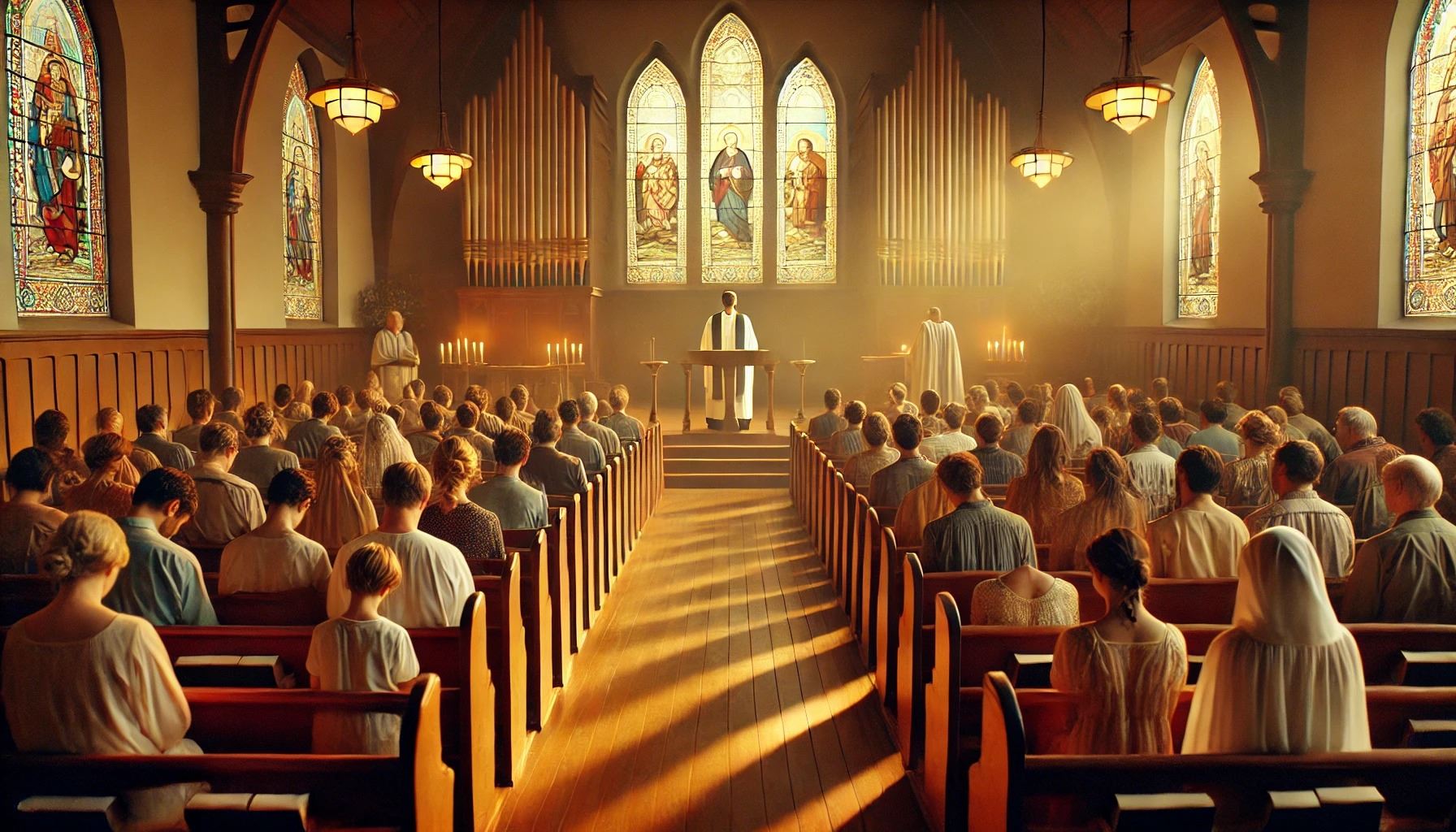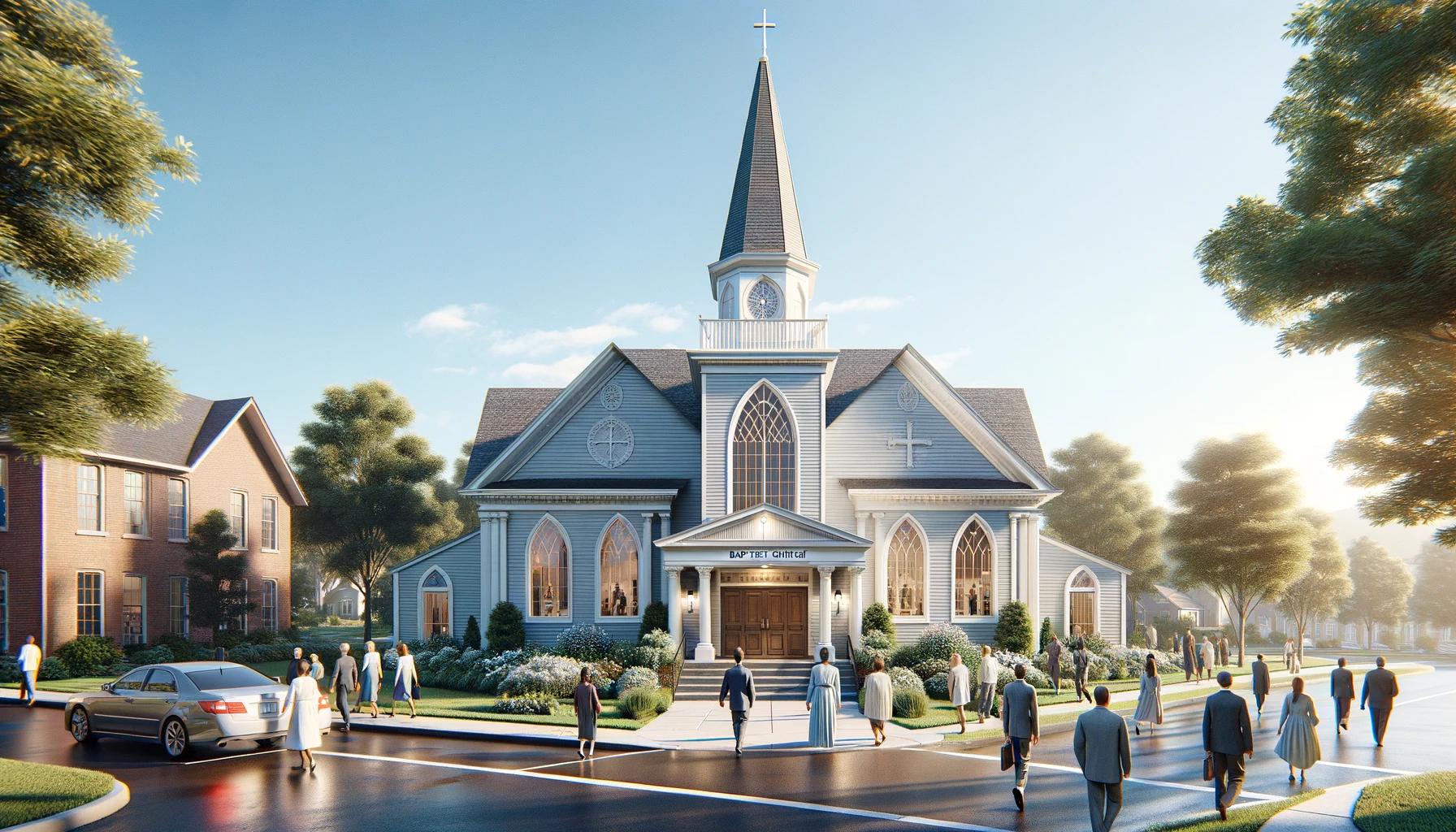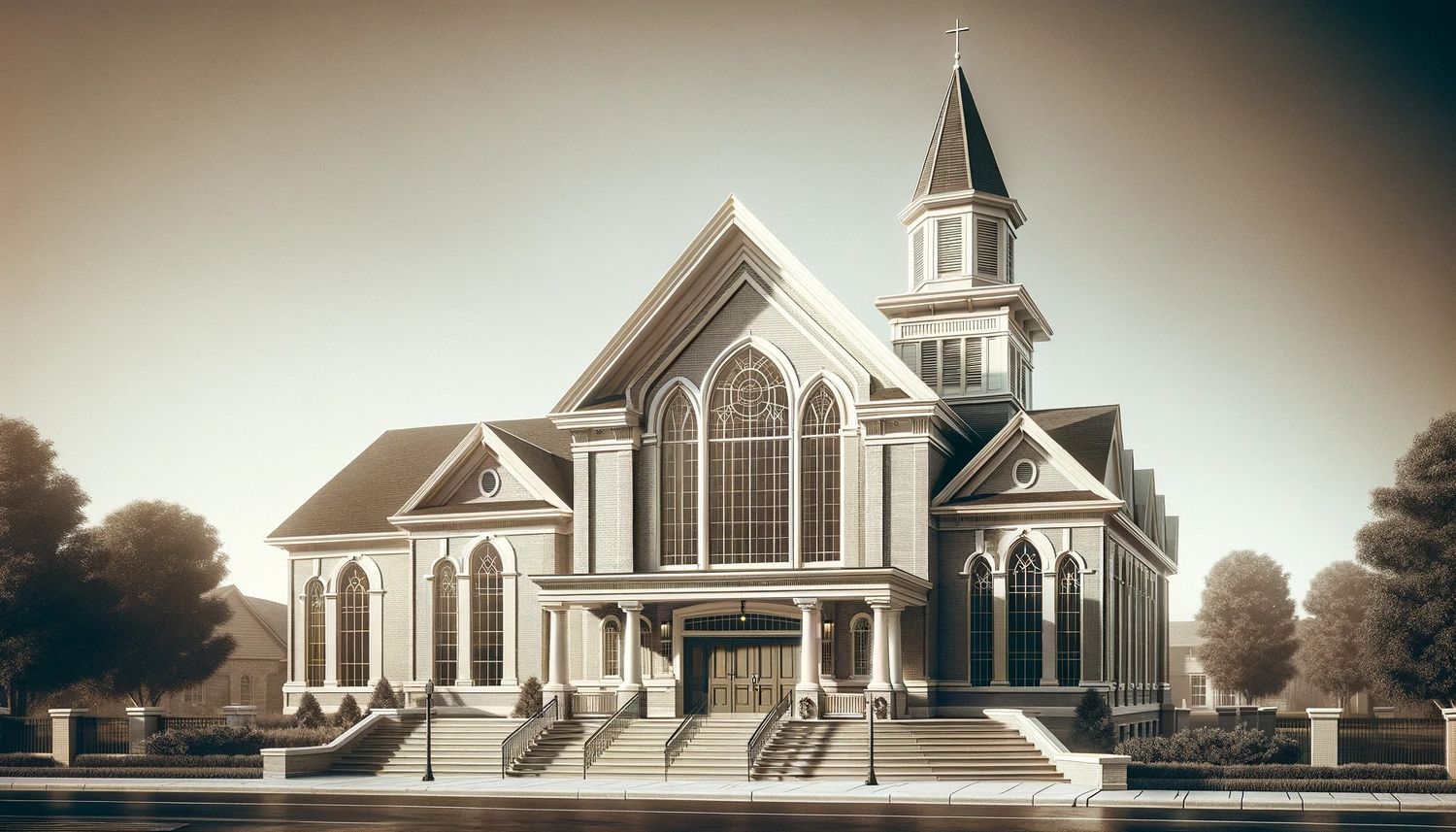Home>Theology and Spirituality>What Are Baptist Church Services Like


Theology and Spirituality
What Are Baptist Church Services Like
Published: February 20, 2024
Ericka Andersen, an editor at Christian.net, expertly merges digital strategy with content creation, focusing on faith and societal issues. Her communication skills enhance the platform's engaging narratives, fostering meaningful dialogue on belief's impact on society.
Discover what to expect at Baptist church services and how they align with theology and spirituality. Explore the unique aspects of Baptist worship and community.
(Many of the links in this article redirect to a specific reviewed product. Your purchase of these products through affiliate links helps to generate commission for Christian.net, at no extra cost. Learn more)
Table of Contents
Introduction
Baptist church services are a vibrant tapestry of faith, community, and worship. Steeped in rich tradition and guided by a deep commitment to biblical principles, these gatherings offer a profound spiritual experience for believers. The Baptist denomination, with its roots tracing back to the early 17th century, has evolved to encompass a diverse array of congregations, each with its own unique customs and practices. As we delve into the essence of Baptist church services, we will uncover the elements that make these gatherings a cornerstone of spiritual life for millions of individuals worldwide.
The hallmark of Baptist church services lies in their emphasis on personal faith and the priesthood of all believers. This foundational belief underscores the democratic nature of Baptist congregations, where each member has the opportunity to actively participate in the worship experience. From the spirited singing of hymns to the fervent proclamation of the Word, Baptist services are characterized by a palpable sense of engagement and involvement.
At the heart of Baptist worship is a deep reverence for the Bible as the ultimate authority in matters of faith and practice. This unwavering commitment to scriptural truth permeates every aspect of the service, shaping the order of worship, the content of sermons, and the administration of sacraments. As we explore the history, structure, and spiritual dimensions of Baptist church services, we will gain a profound appreciation for the enduring legacy of this faith tradition and the profound impact it has had on countless lives.
History of Baptist Church Services
The history of Baptist church services is a compelling narrative that unfolds against the backdrop of religious upheaval and fervent pursuit of spiritual freedom. The roots of the Baptist tradition can be traced back to the early 17th century in England, during a period of intense religious and political turmoil. It was a time when dissenting voices sought to break free from the constraints of state-sanctioned religion and embrace a more personal and authentic expression of faith.
One of the defining moments in the emergence of Baptist church services was the advocacy for believer's baptism, a practice that diverged from the infant baptism commonly practiced in the established churches of the time. This emphasis on adult baptism symbolized a conscious choice to embrace the Christian faith, marking a profound departure from the traditions of the Anglican and Catholic churches.
The early Baptist congregations were characterized by their commitment to congregational autonomy and the priesthood of all believers. This egalitarian ethos empowered every member to actively participate in the life of the church, including the decision-making processes and the conduct of worship services. This democratic approach to church governance was a radical departure from the hierarchical structures prevalent in other Christian denominations.
As Baptist beliefs took root and spread across the Atlantic to the American colonies, the tradition continued to evolve and diversify. The Baptist commitment to religious liberty and the separation of church and state resonated deeply in the New World, where diverse religious communities sought refuge from persecution and oppression.
Over the centuries, Baptist church services have adapted to the cultural and social contexts in which they are situated, giving rise to a rich tapestry of worship practices and traditions. From the exuberant praise and worship of Southern Baptist congregations to the contemplative liturgy of Reformed Baptists, the diversity within the Baptist tradition reflects the dynamic interplay between faith, culture, and community.
The history of Baptist church services is a testament to the enduring legacy of a faith tradition that has weathered the tides of history and remained steadfast in its commitment to the primacy of personal faith, the authority of scripture, and the priesthood of all believers. As we continue to explore the structure and spiritual dimensions of Baptist worship, we will gain a deeper appreciation for the profound impact of this tradition on the lives of believers around the world.
Structure of Baptist Church Services
Baptist church services are characterized by a deliberate and purposeful structure that reflects the core values and beliefs of the denomination. While there can be variations in the order and style of worship among different Baptist congregations, certain elements are integral to the structure of these services.
1. Opening Worship
The service typically commences with a time of congregational singing, often accompanied by a worship band or choir. This segment sets the tone for the worship experience, fostering a sense of unity and reverence as the congregation joins together in praise and adoration.
2. Prayer and Scripture Reading
Following the opening worship, a period of prayer and scripture reading ensues. This serves as a moment for reflection, confession, and seeking God's guidance. The reading of scripture is central to Baptist worship, emphasizing the authority and relevance of the Bible in shaping the life of the church and its members.
Read more: How Long Is A Baptist Church Service
3. Sermon
A hallmark of Baptist services is the preaching of a sermon, which holds a central position in the worship structure. The sermon is an opportunity for the pastor or guest speaker to expound on biblical teachings, offer spiritual insights, and provide practical applications for daily living. It is a time for the congregation to receive spiritual nourishment and guidance through the exposition of God's Word.
4. Music and Worship
Throughout the service, music and worship play a vital role, punctuating the various segments of the worship experience. Hymns, contemporary Christian songs, and instrumental music are often integrated to create an atmosphere of reverence, joy, and spiritual engagement.
5. Offering and Tithes
Baptist services commonly include a segment for the collection of tithes and offerings. This practice reflects the congregation's commitment to stewardship and supporting the work of the church, both locally and globally.
6. Communion and Baptism
Some Baptist congregations incorporate the observance of communion and baptism into their worship services. These sacraments hold deep significance, symbolizing the believer's union with Christ and the community of faith.
7. Closing Worship and Benediction
The service typically concludes with a final time of worship, often accompanied by a benediction pronounced by the pastor. This serves as a moment of blessing and sending forth, as the congregation is encouraged to carry the spirit of worship into their daily lives.
The structure of Baptist church services reflects a deliberate intention to create a worship experience that is centered on God's Word, characterized by congregational participation, and designed to foster spiritual growth and community. This intentional framework underscores the enduring commitment of Baptist congregations to uphold the principles of faith, worship, and fellowship.
Music and Worship
Music and worship are integral components of Baptist church services, serving as a means of spiritual expression, communal praise, and personal connection with the divine. The role of music in Baptist worship is multifaceted, encompassing a diverse repertoire of hymns, contemporary Christian songs, and instrumental arrangements that collectively contribute to the rich tapestry of the worship experience.
Congregational Singing
One of the defining features of Baptist music and worship is congregational singing. As the service commences, the congregation joins together in harmonious melodies, lifting their voices in unison to offer praise and adoration. This collective act of worship fosters a sense of unity and shared devotion, transcending individual voices to create a symphony of faith and reverence. The hymns and songs selected for congregational singing often reflect the themes of praise, thanksgiving, and the redemptive work of Christ, inviting worshippers to engage with the timeless truths of the Christian faith.
Worship Band and Choir
Many Baptist congregations incorporate worship bands or choirs to enhance the musical dimension of the service. These ensembles, comprising vocalists, instrumentalists, and music leaders, contribute to the vibrant and dynamic nature of Baptist worship. The use of contemporary Christian songs and instrumental arrangements adds a layer of diversity to the musical expression, catering to the varied preferences and spiritual inclinations of the congregation. The worship band and choir serve as catalysts for creating an atmosphere of joy, reverence, and spiritual engagement, amplifying the collective worship experience.
Spiritual Atmosphere
Music holds the power to shape the spiritual atmosphere of the worship service, evoking emotions, stirring hearts, and facilitating a deeper connection with the divine. Whether through soul-stirring hymns that resonate with tradition and heritage or contemporary songs that speak to the realities of modern faith, the musical selections in Baptist services are curated to create a space for spiritual encounter and personal reflection. The interplay of music and worship engenders an environment where worshippers can express their faith, find solace in times of trial, and celebrate the transformative work of God in their lives.
Expressive Worship
Baptist music and worship provide a platform for expressive worship, allowing individuals to engage with their faith in a deeply personal and emotive manner. The act of singing, accompanied by instrumental accompaniment, becomes a vehicle for spiritual expression, enabling worshippers to pour out their hearts in adoration, supplication, and surrender. This expressive dimension of worship fosters a sense of intimacy with the divine, inviting worshippers to bring their joys, sorrows, and aspirations before the presence of God through the medium of music.
In essence, the fusion of music and worship in Baptist church services creates a symphony of faith, uniting the congregation in collective praise, fostering a spiritual atmosphere of reverence and joy, and providing a platform for expressive and transformative encounters with the divine. This harmonious integration of music and worship underscores the profound impact of Baptist services in nurturing the spiritual lives of believers and fostering a deep sense of communal devotion.
Preaching and Teaching
At the heart of Baptist church services lies the pivotal element of preaching and teaching. This integral component serves as a beacon of spiritual guidance, a source of biblical insight, and a catalyst for personal and communal transformation. The sermon, delivered by the pastor or a guest speaker, occupies a central position in the worship service, offering a platform for the exposition of scripture, the proclamation of timeless truths, and the application of biblical principles to contemporary life.
The Baptist tradition places a strong emphasis on the authority of scripture, and this foundational belief permeates the preaching and teaching ministry within the church. The sermon is meticulously crafted to illuminate the timeless wisdom encapsulated in the Bible, offering a lens through which the congregation can glean spiritual truths, ethical guidance, and practical wisdom for navigating the complexities of everyday life. The pastor, as the steward of this sacred task, undertakes the responsibility of expounding on scripture with clarity, relevance, and an unwavering commitment to truth.
The preaching and teaching in Baptist services are characterized by their expository nature, often delving into specific passages or themes within the Bible. This approach allows for a comprehensive exploration of the biblical text, enabling the congregation to gain a deeper understanding of the historical context, theological significance, and practical applications of the scriptures. The sermon becomes a conduit for illuminating the relevance of God's Word in the contemporary context, bridging the chasm between ancient wisdom and modern realities.
Furthermore, the preaching and teaching ministry in Baptist church services is designed to edify, challenge, and inspire the congregation. The sermons are crafted to address the spiritual needs of the community, offering solace to the afflicted, encouragement to the weary, and exhortation to pursue a life of faith and righteousness. Through the exposition of scripture, the pastor endeavors to instill a sense of spiritual fervor, moral clarity, and unwavering hope in the hearts of the listeners, nurturing a community of believers who are equipped to navigate the complexities of life with unwavering faith and resilience.
In essence, the preaching and teaching ministry in Baptist church services stands as a testament to the enduring commitment of the tradition to uphold the transformative power of God's Word. It serves as a beacon of light, guiding the congregation through the ebb and flow of life, and nurturing a community of believers who are grounded in the timeless truths of scripture. The sermon becomes a sacred dialogue between the divine and the human, offering spiritual nourishment, intellectual stimulation, and moral fortitude to all who gather to partake in the rich tapestry of Baptist worship.
Baptism and Communion
Baptism and communion hold profound significance within Baptist church services, serving as sacramental expressions of faith, unity, and spiritual renewal. These sacred rituals, rooted in the teachings of the New Testament, symbolize the believer's union with Christ, the community of faith, and the redemptive work of God.
Read more: What Are Lutheran Church Services Like
Baptism
Baptism occupies a central position in Baptist theology, signifying the believer's public profession of faith and their identification with the death, burial, and resurrection of Jesus Christ. The act of baptism by immersion, a distinctive practice within the Baptist tradition, embodies the spiritual journey of dying to sin and rising to new life in Christ. This symbolic immersion in water represents the cleansing of sin and the emergence of a transformed and redeemed life, reflecting the believer's commitment to follow Christ wholeheartedly.
Baptism in Baptist church services is a solemn and joyous occasion, witnessed by the congregation as a tangible testimony of the believer's faith. It serves as a communal affirmation of the individual's decision to embrace the Christian faith and embark on a journey of discipleship. The act of baptism not only signifies personal spiritual rebirth but also fosters a sense of unity and solidarity within the community of believers, reinforcing the shared commitment to walk in the footsteps of Christ.
Communion
Communion, also known as the Lord's Supper or the Eucharist, holds a sacred place in Baptist worship, commemorating the sacrificial death and triumphant resurrection of Jesus Christ. The partaking of bread and wine, symbolizing the body and blood of Christ, serves as a poignant reminder of the redemptive grace and unifying love that permeate the Christian faith. In Baptist church services, communion is observed as a solemn yet celebratory act, inviting believers to partake in a spiritual feast that nourishes the soul and fortifies the bonds of fellowship.
The observance of communion in Baptist services underscores the profound spiritual intimacy between the believer and the divine, as well as the interconnectedness of the faith community. Through the shared participation in the elements of communion, believers reaffirm their covenant with God and with one another, acknowledging the transformative power of Christ's sacrifice and the unbreakable bond that unites them as members of the body of Christ.
In essence, baptism and communion stand as sacred pillars within Baptist church services, embodying the timeless truths, spiritual vitality, and communal solidarity that define the Christian faith. These sacraments serve as tangible expressions of the believer's journey of faith, encapsulating the profound mysteries of redemption, renewal, and divine communion. As integral components of Baptist worship, baptism and communion continue to enrich the spiritual tapestry of the tradition, fostering a deep sense of reverence, unity, and spiritual nourishment within the faith community.
Community and Fellowship
Community and fellowship form the vibrant heart of Baptist church services, embodying the ethos of shared faith, mutual support, and communal belonging. The Baptist tradition places a profound emphasis on the interconnectedness of believers, fostering a sense of spiritual kinship and collective responsibility within the faith community.
At the core of Baptist church services lies the spirit of inclusivity and genuine fellowship, where individuals from diverse backgrounds converge to form a tapestry of faith and unity. The congregation serves as a nurturing environment where individuals find solace, encouragement, and a sense of belonging amidst the ebb and flow of life's journey. The fellowship extends beyond the confines of the church building, permeating the daily lives of believers and nurturing enduring bonds of friendship and support.
The communal aspect of Baptist worship is exemplified through various initiatives and gatherings that foster a sense of togetherness and shared purpose. From small group studies and prayer circles to community outreach programs and social gatherings, Baptist church services provide a fertile ground for cultivating meaningful relationships and fostering a culture of care and compassion. The spirit of fellowship extends to encompass the joys and sorrows of each member, creating a network of support and encouragement that transcends individual experiences.
Furthermore, the community and fellowship within Baptist church services serve as a catalyst for collective engagement in acts of service, compassion, and social justice. The congregation actively participates in initiatives aimed at addressing societal needs, extending a helping hand to the marginalized, and advocating for the principles of love, justice, and mercy. This ethos of communal engagement reflects the Baptist commitment to embodying the teachings of Christ through tangible acts of kindness and social responsibility.
In essence, the community and fellowship within Baptist church services encapsulate the essence of shared faith, mutual support, and collective mission. It is within the embrace of this nurturing community that believers find strength, encouragement, and a sense of purpose as they navigate the complexities of life. The spirit of fellowship continues to be a cornerstone of the Baptist tradition, fostering a vibrant and inclusive community where the transformative power of faith is manifested through the bonds of love, compassion, and shared commitment to the common good.
Conclusion
In conclusion, Baptist church services stand as a testament to the enduring legacy of a faith tradition that has weathered the tides of history and remained steadfast in its commitment to the primacy of personal faith, the authority of scripture, and the priesthood of all believers. The rich tapestry of Baptist worship, characterized by its deliberate structure, vibrant music and worship, profound preaching and teaching, sacramental observances, and nurturing community, reflects the deep spiritual ethos that permeates the tradition.
The history of Baptist church services, rooted in the pursuit of religious freedom and the primacy of personal faith, has evolved to encompass a diverse array of worship practices and traditions. From the fervent advocacy for believer's baptism to the commitment to congregational autonomy, the Baptist tradition has carved a distinctive path that continues to resonate with millions of believers worldwide.
The structure of Baptist church services, marked by its intentional framework and emphasis on congregational participation, creates a worship experience that is centered on God's Word, fostering spiritual growth and community. The deliberate order of worship, punctuated by moments of prayer, scripture reading, preaching, and sacramental observances, reflects the enduring commitment of Baptist congregations to uphold the principles of faith, worship, and fellowship.
Music and worship in Baptist services create a symphony of faith, uniting the congregation in collective praise, fostering a spiritual atmosphere of reverence and joy, and providing a platform for expressive and transformative encounters with the divine. The integration of congregational singing, worship bands, and choirs serves as a catalyst for creating an atmosphere of spiritual encounter and personal connection with the divine.
The preaching and teaching ministry in Baptist church services stands as a beacon of light, guiding the congregation through the ebb and flow of life, and nurturing a community of believers who are grounded in the timeless truths of scripture. The sermon becomes a sacred dialogue between the divine and the human, offering spiritual nourishment, intellectual stimulation, and moral fortitude to all who gather to partake in the rich tapestry of Baptist worship.
Baptism and communion, as integral components of Baptist worship, continue to enrich the spiritual tapestry of the tradition, fostering a deep sense of reverence, unity, and spiritual nourishment within the faith community. These sacraments serve as tangible expressions of the believer's journey of faith, encapsulating the profound mysteries of redemption, renewal, and divine communion.
The community and fellowship within Baptist church services embody the ethos of shared faith, mutual support, and communal belonging. The spirit of inclusivity and genuine fellowship nurtures enduring bonds of friendship and support, creating a network of care and compassion that transcends individual experiences.
In essence, Baptist church services offer a profound spiritual experience, rooted in tradition, yet dynamically attuned to the contemporary needs of believers. The enduring legacy of Baptist worship continues to resonate with the timeless truths of the Christian faith, fostering a vibrant and inclusive community where the transformative power of faith is manifested through the bonds of love, compassion, and shared commitment to the common good.











